Value-Based Leadership Report: Personal Values, Skills, and Practices
VerifiedAdded on 2023/04/10
|7
|971
|467
Report
AI Summary
This report delves into value-based leadership, emphasizing the importance of personal values and their synchronization with organizational practices. It identifies key personal values such as responsibility, integrity, fairness, and learning, and explores their alignment with the skills required for effective leadership. The report discusses how these values contribute to ethical decision-making, goal setting, and navigating complex situations. It analyzes the alignment of personal values with organizational practices, highlighting areas of strength and weakness, and suggests strategies for strengthening this alignment. The report concludes by reflecting on the development of a leadership mindset, emphasizing the importance of responsibility, fairness, integrity, and continuous learning. It also includes personal mission and vision statements, reinforcing the significance of personal values in both professional and personal growth.
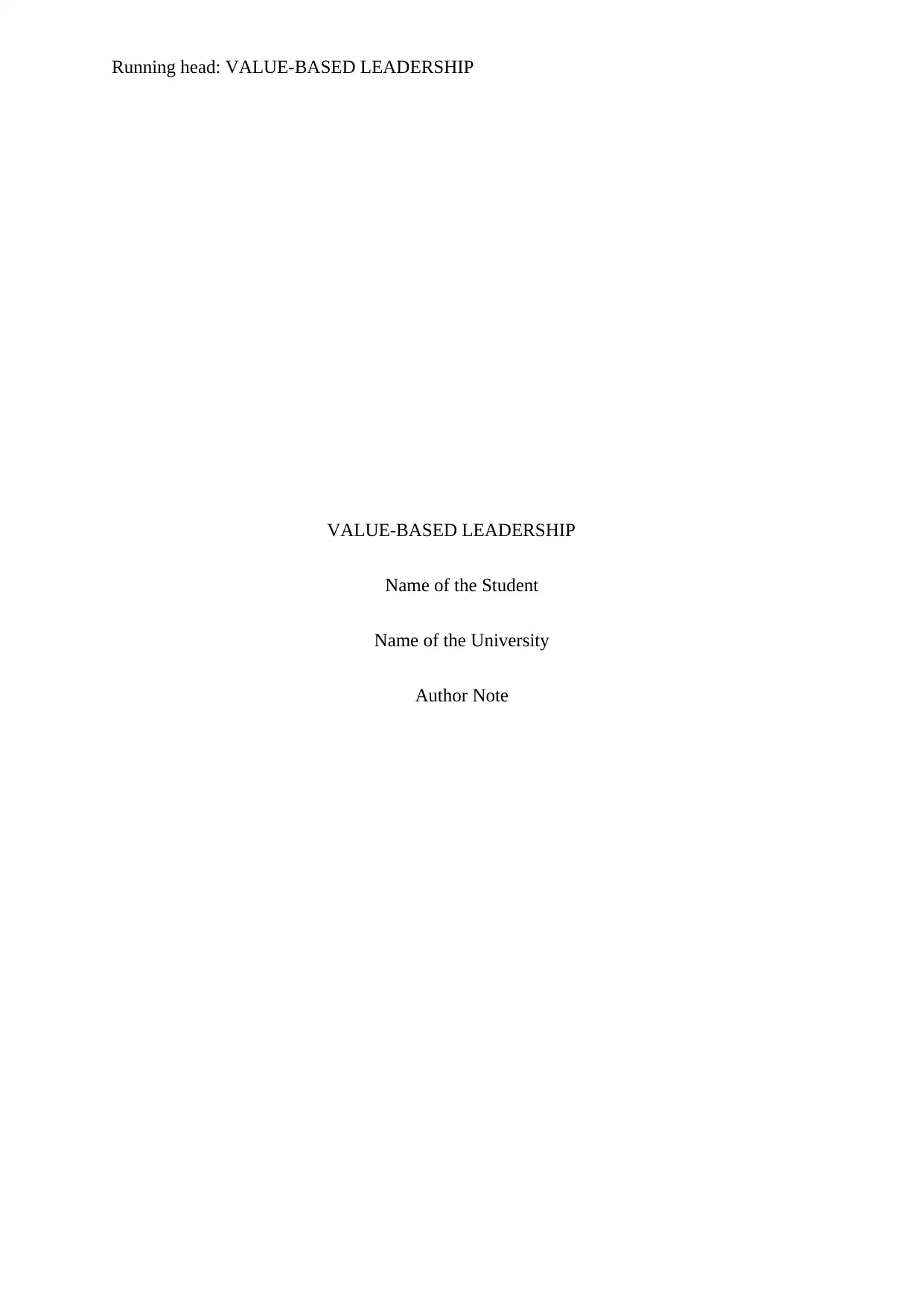
Running head: VALUE-BASED LEADERSHIP
VALUE-BASED LEADERSHIP
Name of the Student
Name of the University
Author Note
VALUE-BASED LEADERSHIP
Name of the Student
Name of the University
Author Note
Paraphrase This Document
Need a fresh take? Get an instant paraphrase of this document with our AI Paraphraser
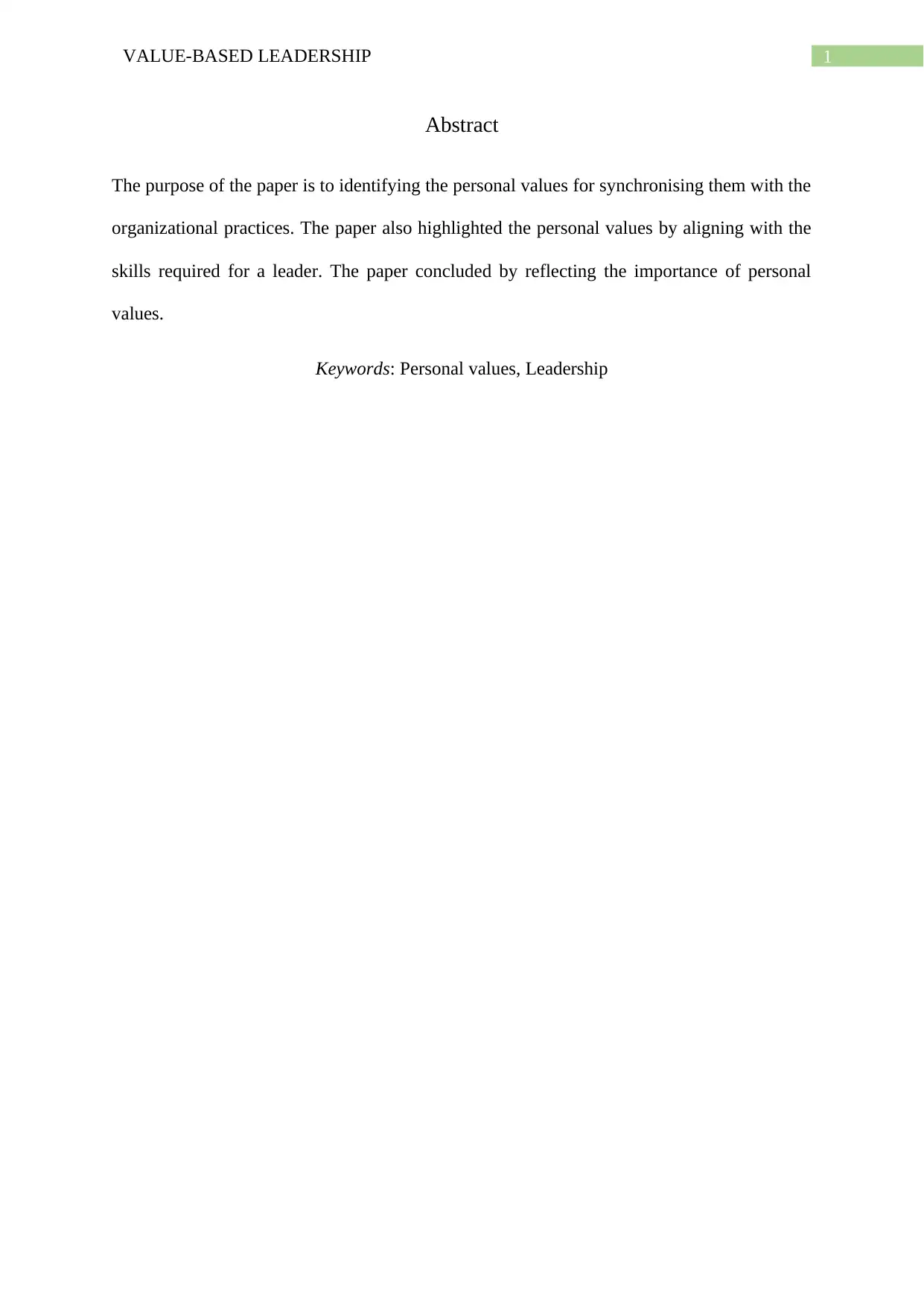
1VALUE-BASED LEADERSHIP
Abstract
The purpose of the paper is to identifying the personal values for synchronising them with the
organizational practices. The paper also highlighted the personal values by aligning with the
skills required for a leader. The paper concluded by reflecting the importance of personal
values.
Keywords: Personal values, Leadership
Abstract
The purpose of the paper is to identifying the personal values for synchronising them with the
organizational practices. The paper also highlighted the personal values by aligning with the
skills required for a leader. The paper concluded by reflecting the importance of personal
values.
Keywords: Personal values, Leadership
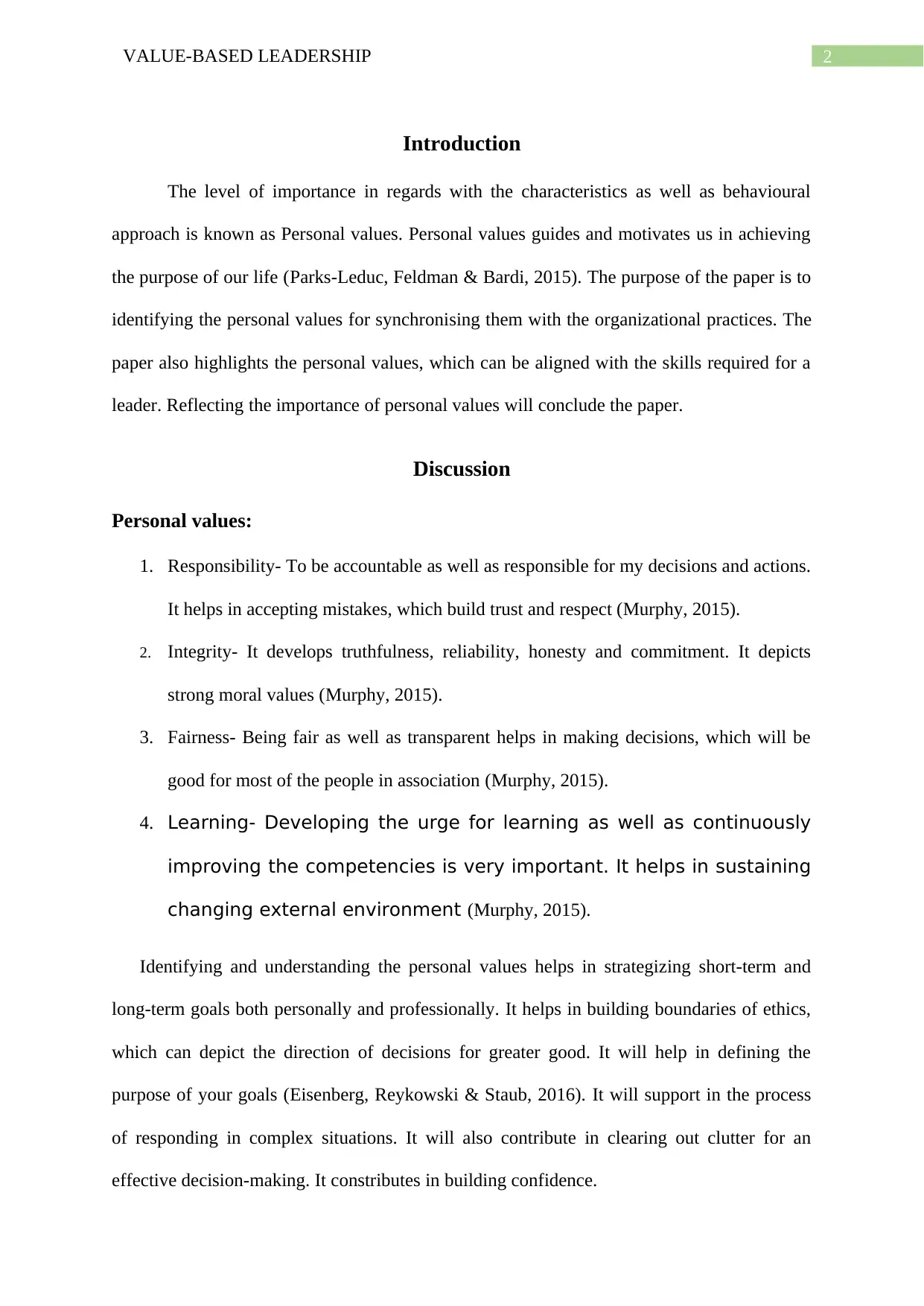
2VALUE-BASED LEADERSHIP
Introduction
The level of importance in regards with the characteristics as well as behavioural
approach is known as Personal values. Personal values guides and motivates us in achieving
the purpose of our life (Parks-Leduc, Feldman & Bardi, 2015). The purpose of the paper is to
identifying the personal values for synchronising them with the organizational practices. The
paper also highlights the personal values, which can be aligned with the skills required for a
leader. Reflecting the importance of personal values will conclude the paper.
Discussion
Personal values:
1. Responsibility- To be accountable as well as responsible for my decisions and actions.
It helps in accepting mistakes, which build trust and respect (Murphy, 2015).
2. Integrity- It develops truthfulness, reliability, honesty and commitment. It depicts
strong moral values (Murphy, 2015).
3. Fairness- Being fair as well as transparent helps in making decisions, which will be
good for most of the people in association (Murphy, 2015).
4. Learning- Developing the urge for learning as well as continuously
improving the competencies is very important. It helps in sustaining
changing external environment (Murphy, 2015).
Identifying and understanding the personal values helps in strategizing short-term and
long-term goals both personally and professionally. It helps in building boundaries of ethics,
which can depict the direction of decisions for greater good. It will help in defining the
purpose of your goals (Eisenberg, Reykowski & Staub, 2016). It will support in the process
of responding in complex situations. It will also contribute in clearing out clutter for an
effective decision-making. It constributes in building confidence.
Introduction
The level of importance in regards with the characteristics as well as behavioural
approach is known as Personal values. Personal values guides and motivates us in achieving
the purpose of our life (Parks-Leduc, Feldman & Bardi, 2015). The purpose of the paper is to
identifying the personal values for synchronising them with the organizational practices. The
paper also highlights the personal values, which can be aligned with the skills required for a
leader. Reflecting the importance of personal values will conclude the paper.
Discussion
Personal values:
1. Responsibility- To be accountable as well as responsible for my decisions and actions.
It helps in accepting mistakes, which build trust and respect (Murphy, 2015).
2. Integrity- It develops truthfulness, reliability, honesty and commitment. It depicts
strong moral values (Murphy, 2015).
3. Fairness- Being fair as well as transparent helps in making decisions, which will be
good for most of the people in association (Murphy, 2015).
4. Learning- Developing the urge for learning as well as continuously
improving the competencies is very important. It helps in sustaining
changing external environment (Murphy, 2015).
Identifying and understanding the personal values helps in strategizing short-term and
long-term goals both personally and professionally. It helps in building boundaries of ethics,
which can depict the direction of decisions for greater good. It will help in defining the
purpose of your goals (Eisenberg, Reykowski & Staub, 2016). It will support in the process
of responding in complex situations. It will also contribute in clearing out clutter for an
effective decision-making. It constributes in building confidence.
⊘ This is a preview!⊘
Do you want full access?
Subscribe today to unlock all pages.

Trusted by 1+ million students worldwide
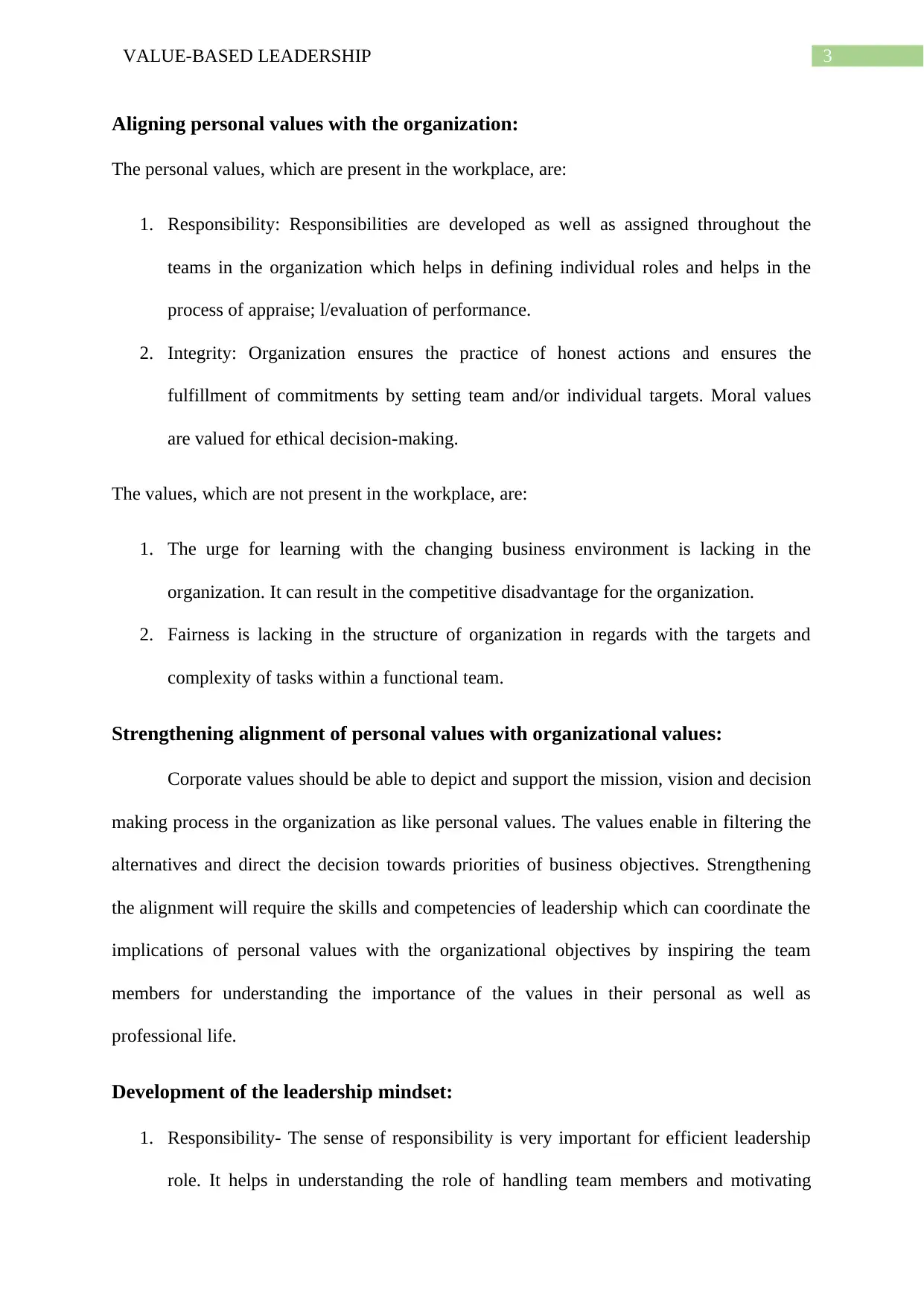
3VALUE-BASED LEADERSHIP
Aligning personal values with the organization:
The personal values, which are present in the workplace, are:
1. Responsibility: Responsibilities are developed as well as assigned throughout the
teams in the organization which helps in defining individual roles and helps in the
process of appraise; l/evaluation of performance.
2. Integrity: Organization ensures the practice of honest actions and ensures the
fulfillment of commitments by setting team and/or individual targets. Moral values
are valued for ethical decision-making.
The values, which are not present in the workplace, are:
1. The urge for learning with the changing business environment is lacking in the
organization. It can result in the competitive disadvantage for the organization.
2. Fairness is lacking in the structure of organization in regards with the targets and
complexity of tasks within a functional team.
Strengthening alignment of personal values with organizational values:
Corporate values should be able to depict and support the mission, vision and decision
making process in the organization as like personal values. The values enable in filtering the
alternatives and direct the decision towards priorities of business objectives. Strengthening
the alignment will require the skills and competencies of leadership which can coordinate the
implications of personal values with the organizational objectives by inspiring the team
members for understanding the importance of the values in their personal as well as
professional life.
Development of the leadership mindset:
1. Responsibility- The sense of responsibility is very important for efficient leadership
role. It helps in understanding the role of handling team members and motivating
Aligning personal values with the organization:
The personal values, which are present in the workplace, are:
1. Responsibility: Responsibilities are developed as well as assigned throughout the
teams in the organization which helps in defining individual roles and helps in the
process of appraise; l/evaluation of performance.
2. Integrity: Organization ensures the practice of honest actions and ensures the
fulfillment of commitments by setting team and/or individual targets. Moral values
are valued for ethical decision-making.
The values, which are not present in the workplace, are:
1. The urge for learning with the changing business environment is lacking in the
organization. It can result in the competitive disadvantage for the organization.
2. Fairness is lacking in the structure of organization in regards with the targets and
complexity of tasks within a functional team.
Strengthening alignment of personal values with organizational values:
Corporate values should be able to depict and support the mission, vision and decision
making process in the organization as like personal values. The values enable in filtering the
alternatives and direct the decision towards priorities of business objectives. Strengthening
the alignment will require the skills and competencies of leadership which can coordinate the
implications of personal values with the organizational objectives by inspiring the team
members for understanding the importance of the values in their personal as well as
professional life.
Development of the leadership mindset:
1. Responsibility- The sense of responsibility is very important for efficient leadership
role. It helps in understanding the role of handling team members and motivating
Paraphrase This Document
Need a fresh take? Get an instant paraphrase of this document with our AI Paraphraser
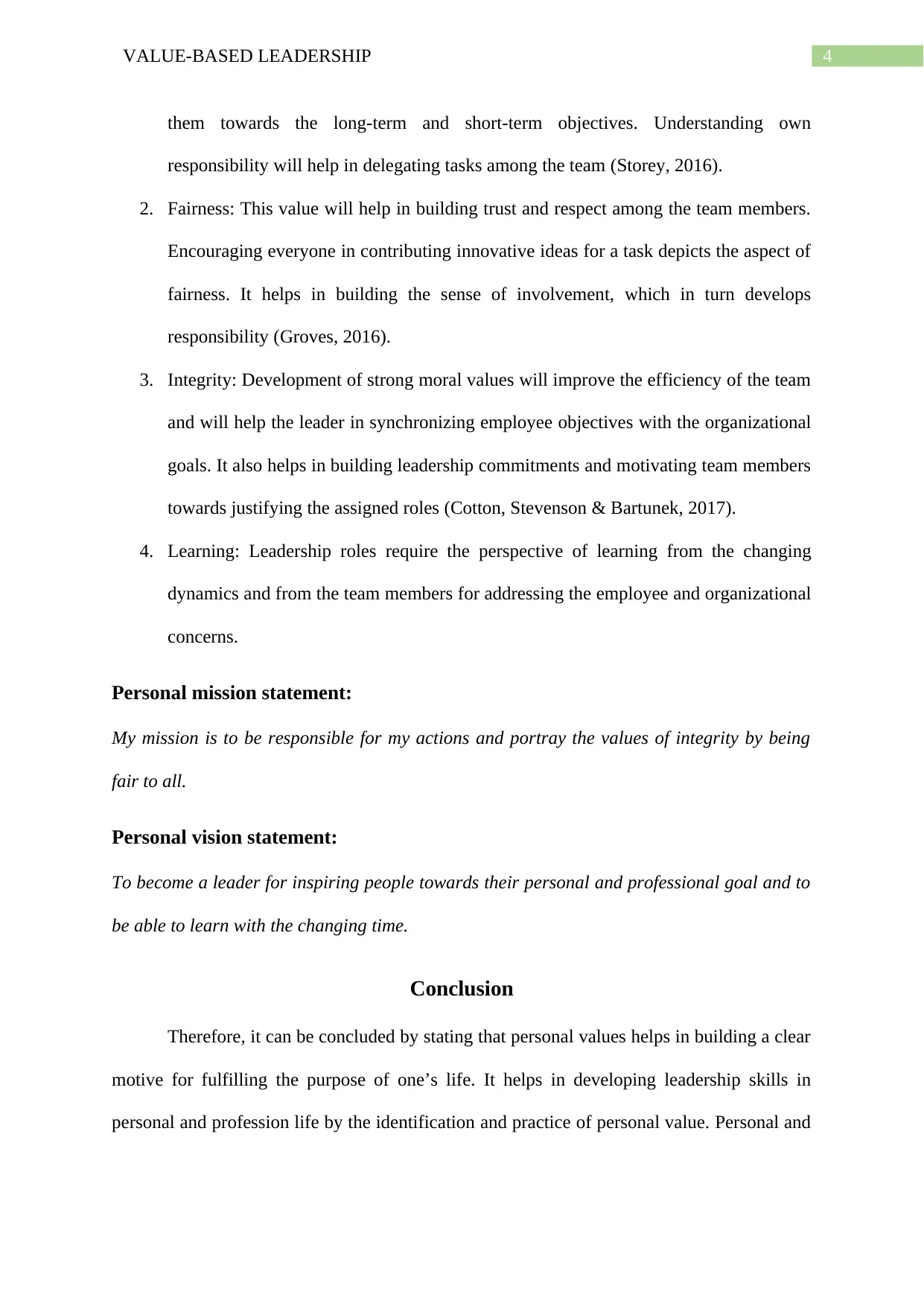
4VALUE-BASED LEADERSHIP
them towards the long-term and short-term objectives. Understanding own
responsibility will help in delegating tasks among the team (Storey, 2016).
2. Fairness: This value will help in building trust and respect among the team members.
Encouraging everyone in contributing innovative ideas for a task depicts the aspect of
fairness. It helps in building the sense of involvement, which in turn develops
responsibility (Groves, 2016).
3. Integrity: Development of strong moral values will improve the efficiency of the team
and will help the leader in synchronizing employee objectives with the organizational
goals. It also helps in building leadership commitments and motivating team members
towards justifying the assigned roles (Cotton, Stevenson & Bartunek, 2017).
4. Learning: Leadership roles require the perspective of learning from the changing
dynamics and from the team members for addressing the employee and organizational
concerns.
Personal mission statement:
My mission is to be responsible for my actions and portray the values of integrity by being
fair to all.
Personal vision statement:
To become a leader for inspiring people towards their personal and professional goal and to
be able to learn with the changing time.
Conclusion
Therefore, it can be concluded by stating that personal values helps in building a clear
motive for fulfilling the purpose of one’s life. It helps in developing leadership skills in
personal and profession life by the identification and practice of personal value. Personal and
them towards the long-term and short-term objectives. Understanding own
responsibility will help in delegating tasks among the team (Storey, 2016).
2. Fairness: This value will help in building trust and respect among the team members.
Encouraging everyone in contributing innovative ideas for a task depicts the aspect of
fairness. It helps in building the sense of involvement, which in turn develops
responsibility (Groves, 2016).
3. Integrity: Development of strong moral values will improve the efficiency of the team
and will help the leader in synchronizing employee objectives with the organizational
goals. It also helps in building leadership commitments and motivating team members
towards justifying the assigned roles (Cotton, Stevenson & Bartunek, 2017).
4. Learning: Leadership roles require the perspective of learning from the changing
dynamics and from the team members for addressing the employee and organizational
concerns.
Personal mission statement:
My mission is to be responsible for my actions and portray the values of integrity by being
fair to all.
Personal vision statement:
To become a leader for inspiring people towards their personal and professional goal and to
be able to learn with the changing time.
Conclusion
Therefore, it can be concluded by stating that personal values helps in building a clear
motive for fulfilling the purpose of one’s life. It helps in developing leadership skills in
personal and profession life by the identification and practice of personal value. Personal and
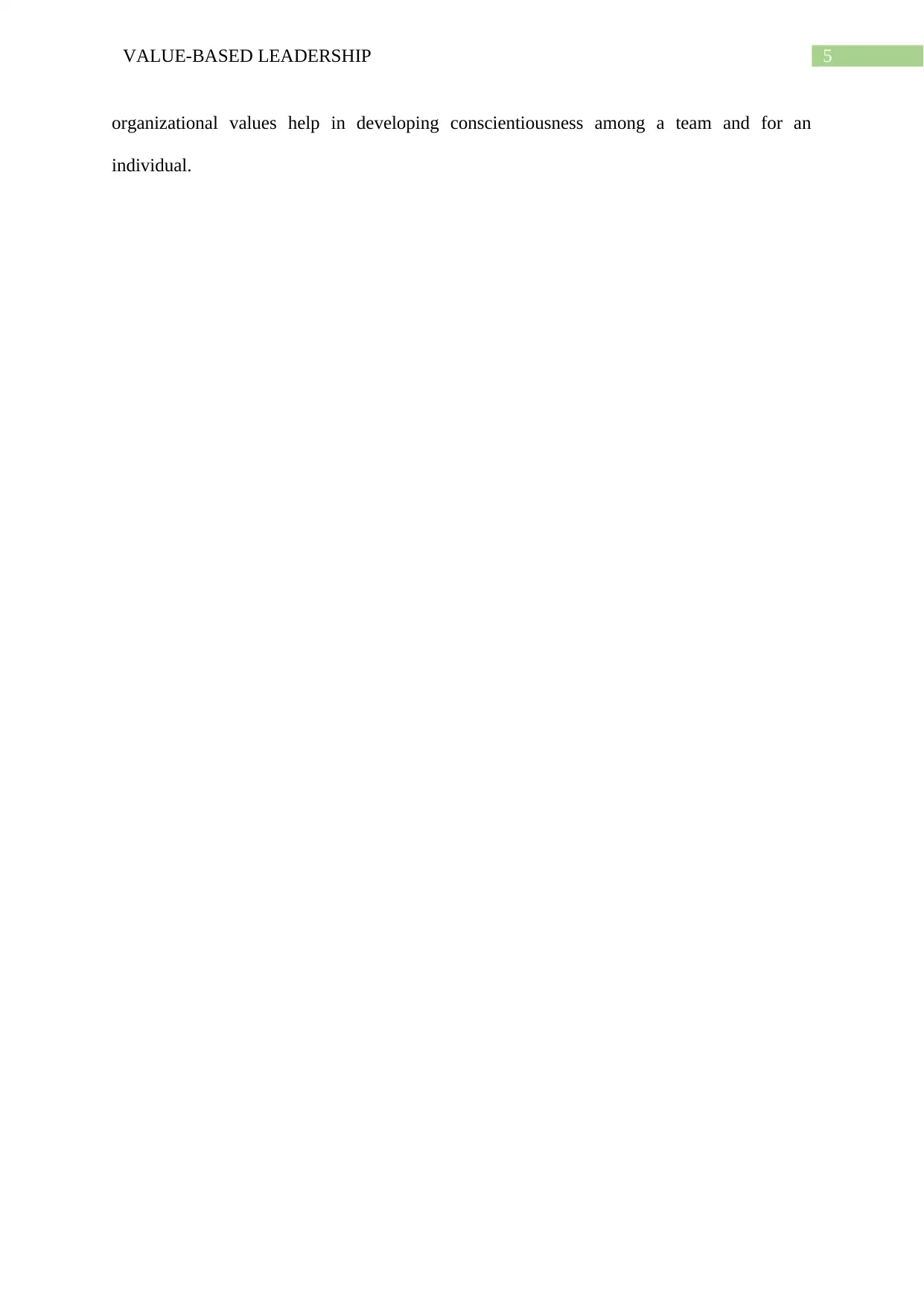
5VALUE-BASED LEADERSHIP
organizational values help in developing conscientiousness among a team and for an
individual.
organizational values help in developing conscientiousness among a team and for an
individual.
⊘ This is a preview!⊘
Do you want full access?
Subscribe today to unlock all pages.

Trusted by 1+ million students worldwide
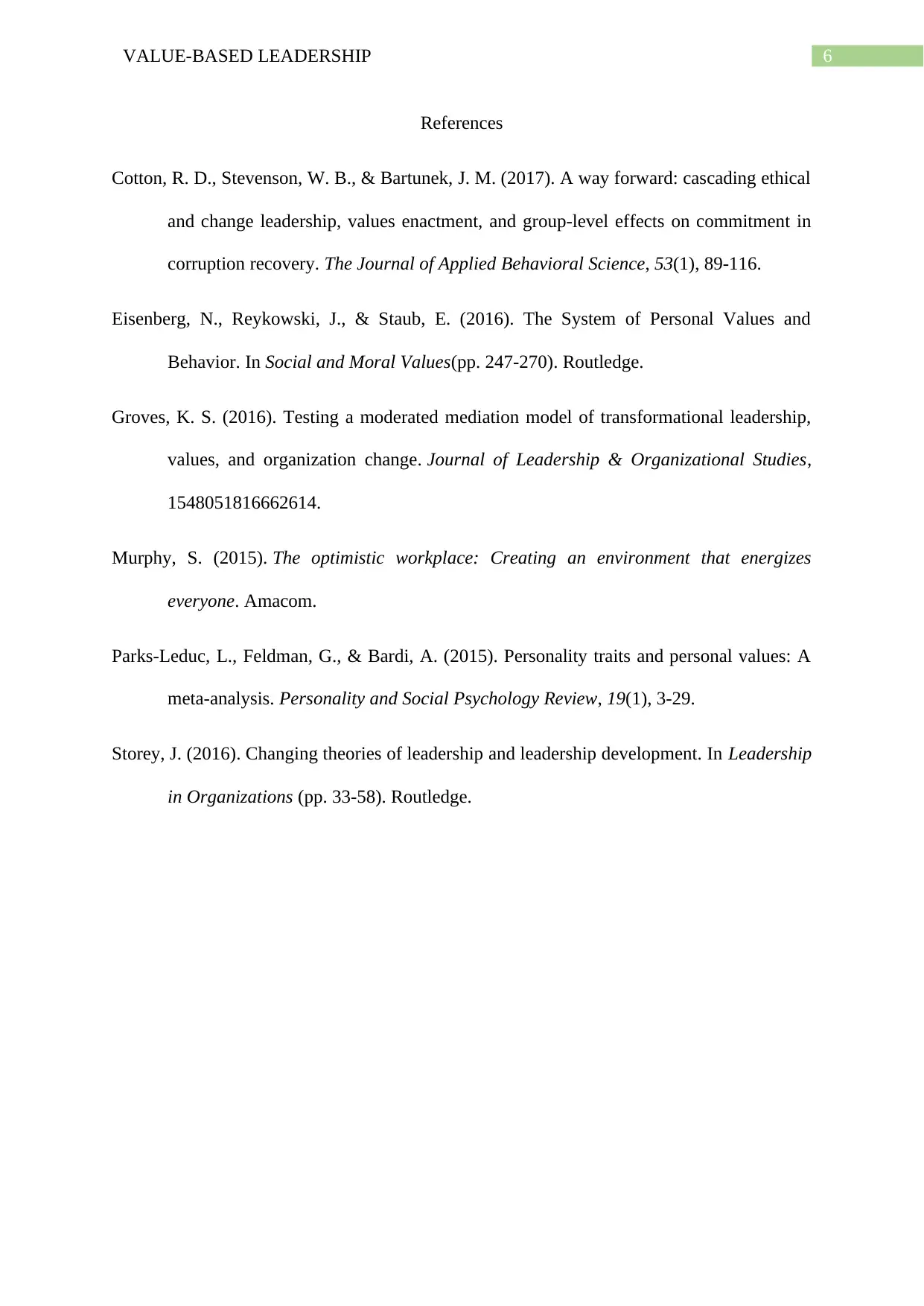
6VALUE-BASED LEADERSHIP
References
Cotton, R. D., Stevenson, W. B., & Bartunek, J. M. (2017). A way forward: cascading ethical
and change leadership, values enactment, and group-level effects on commitment in
corruption recovery. The Journal of Applied Behavioral Science, 53(1), 89-116.
Eisenberg, N., Reykowski, J., & Staub, E. (2016). The System of Personal Values and
Behavior. In Social and Moral Values(pp. 247-270). Routledge.
Groves, K. S. (2016). Testing a moderated mediation model of transformational leadership,
values, and organization change. Journal of Leadership & Organizational Studies,
1548051816662614.
Murphy, S. (2015). The optimistic workplace: Creating an environment that energizes
everyone. Amacom.
Parks-Leduc, L., Feldman, G., & Bardi, A. (2015). Personality traits and personal values: A
meta-analysis. Personality and Social Psychology Review, 19(1), 3-29.
Storey, J. (2016). Changing theories of leadership and leadership development. In Leadership
in Organizations (pp. 33-58). Routledge.
References
Cotton, R. D., Stevenson, W. B., & Bartunek, J. M. (2017). A way forward: cascading ethical
and change leadership, values enactment, and group-level effects on commitment in
corruption recovery. The Journal of Applied Behavioral Science, 53(1), 89-116.
Eisenberg, N., Reykowski, J., & Staub, E. (2016). The System of Personal Values and
Behavior. In Social and Moral Values(pp. 247-270). Routledge.
Groves, K. S. (2016). Testing a moderated mediation model of transformational leadership,
values, and organization change. Journal of Leadership & Organizational Studies,
1548051816662614.
Murphy, S. (2015). The optimistic workplace: Creating an environment that energizes
everyone. Amacom.
Parks-Leduc, L., Feldman, G., & Bardi, A. (2015). Personality traits and personal values: A
meta-analysis. Personality and Social Psychology Review, 19(1), 3-29.
Storey, J. (2016). Changing theories of leadership and leadership development. In Leadership
in Organizations (pp. 33-58). Routledge.
1 out of 7
Related Documents
Your All-in-One AI-Powered Toolkit for Academic Success.
+13062052269
info@desklib.com
Available 24*7 on WhatsApp / Email
![[object Object]](/_next/static/media/star-bottom.7253800d.svg)
Unlock your academic potential
Copyright © 2020–2025 A2Z Services. All Rights Reserved. Developed and managed by ZUCOL.





